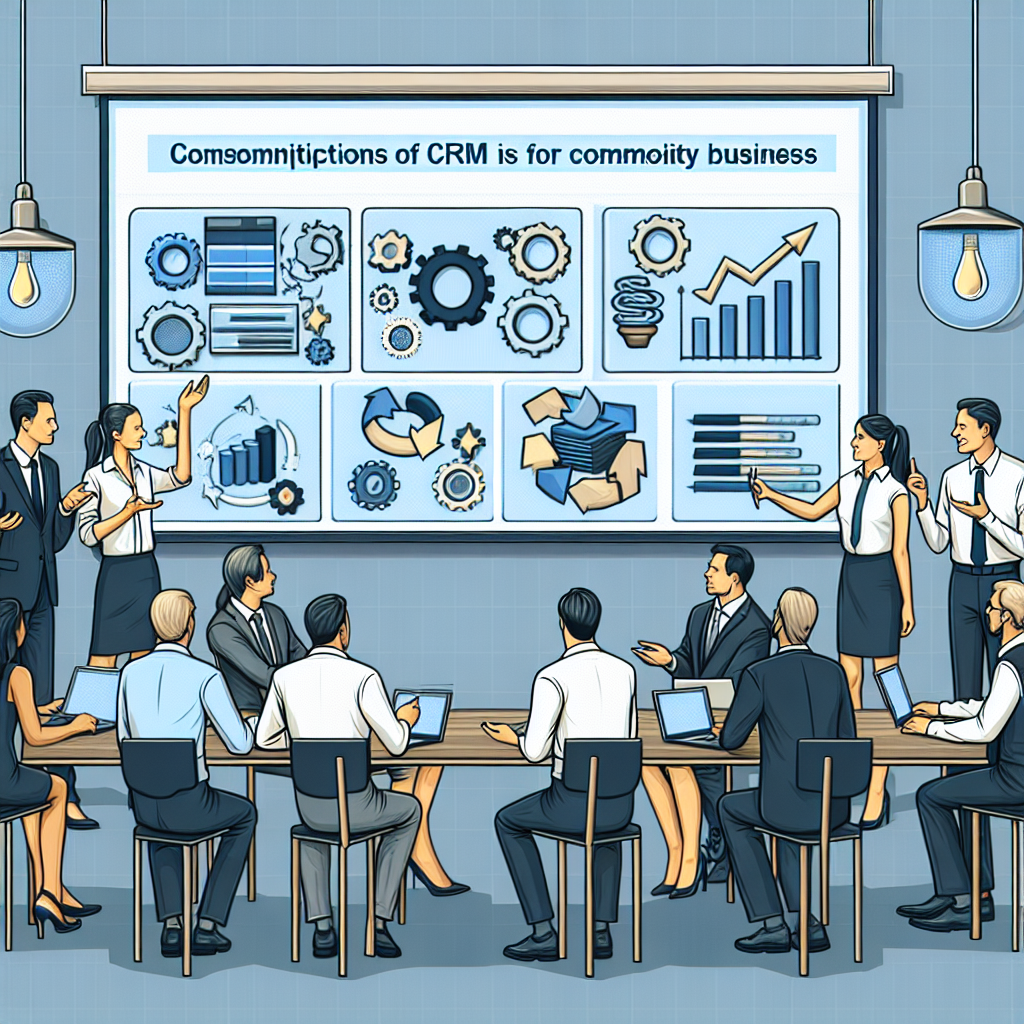Comprehensive CRMs for Product Businesses – Discover your Ideal Solution!

Unraveling the Power of CRM for product business: Why Your Company Needs It Today

Have you ever felt overwhelmed managing customer information, sales, and communications for your product business all at once? Youre not alone! In todays fast-paced market, many businesses struggle to keep everything organized. That’s where a CRM for product business steps in, offering a streamlined solution tailored precisely to your needs. ⭐
The Core Benefits of Implementing a CRM System
Imagine waking up each day knowing that all your customer interactions are neatly organized and easily accessible. With a good CRM system, this vision becomes reality. Here’s why investing in one is essential:
- ⭐ Organized Information: All customer data is in one easy-to-use platform, making it effortless to track interactions and sales history.
- ⭐ Enhanced Sales: Businesses that utilize a CRM for product business can boost sales by up to 29%, according to studies!
- ⭐ Detailed Analytics: Use data-driven insights to make informed decisions that propel your business forward.
- ⭐ Improved Customer Relationships: Connect with clients on a personal level, leading to higher satisfaction and retention rates.
Real-Life Scenarios
Let’s take John, a furniture retailer. Before implementing a CRM, he was juggling dozens of spreadsheets and struggling to keep track of his clients. After turning to artivale.com and investing in a modern CRM system, John saw his customer engagement increase by 40%. His sales team now spends less time searching for information and more time selling!
Another example is Elena, who manages an online cosmetics store. Initially, she relied on email and notes to track customer orders, leading to confusion. With a more robust CRM in place, she can now automate customer follow-ups, leading to a significant increase in repeat purchases. ⭐
How Much Does CRM Cost Per Month?
One of the most common questions is, How much does CRM cost per month? The answer varies based on the features you need and the scale of your operations. On average, businesses spend around €6000 for a comprehensive CRM system. However, when you consider the potential increase in sales and efficiency, its an investment that pays off quickly!
| CRM Features | Cost (EUR) |
|---|---|
| Basic CRM System | €150 |
| Sales Tracking Tools | €250 |
| Customer Support Integration | €400 |
| Advanced Analytics | €600 |
| Online Store Integration | €750 |
| Email Marketing Tools | €800 |
| Mobile Access | €900 |
| Custom Features Development | €1000 |
| Technical Support | €50/month |
| Training and Implementation | €450 |
Debunking Myths: Is CRM for Product Business Really Worth the Investment?
Theres often skepticism surrounding CRMs: “Will this really help my business?” The answer is a resounding yes! Businesses that utilize a CRM for product business often report a decrease in administrative tasks by up to 52%, allowing your team to focus on creativity and customer engagement. Plus, the potential for growth is immense! Consider the story of a small clothing brand that, after adopting a CRM, doubled its customer base in under a year.
Dont just take our word for it—hear from satisfied clients like Alex, who saw his boutiques profits rise significantly after using our services at artivale.com. He claims that the ease of accessing customer data has transformed not just sales, but also how he connects with customers on a personal level. Isn’t that what every business strives for?✨
Take the Next Step!
Feeling inspired? Ready to dive into CRM and transform your product business? Don’t wait! Reach out to us at artivale.com. Call Alexandra at [email protected] for personalized solutions tailored just for you. Your dream of a structured, efficient, and productive business is just a phone call away! ⭐
Frequently Asked Questions
- What is a CRM? A Customer Relationship Management (CRM) system helps businesses manage customer interactions, data, and improve relationships.
- How can a CRM improve my business? By streamlining processes, improving customer relationships, and providing actionable insights from data.
- How easy is it to implement a CRM? Implementation varies but with professional help, it can be quick and easy. Our team can assist you!
- Can I customize my CRM? Yes, we offer tailored CRM solutions that fit your specific needs and industry.
- Is CRM costly? Costs can vary, but with the right strategy, the ROI often far outweighs initial expenses.
- Do I need tech skills to use a CRM? No, our systems are user-friendly and we provide training to ensure your team is comfortable.
- Will a CRM help with my marketing efforts? Absolutely! It provides valuable insights for your marketing strategies.
- Can a CRM integrate with my existing tools? Yes, many CRMs offer integrations with popular tools for seamless operations.
- How safe is my data with a CRM? Our systems employ robust security measures to keep your data protected.
- What types of businesses can benefit from a CRM? Any business that interacts with customers can find value in a CRM.
How Much Does CRM Cost Per Month? Breaking Down the Budget for Your Product Business

When it comes to managing a successful product business, understanding how much a CRM costs per month is crucial for budgeting. In this fast-paced digital age, investing wisely can make all the difference in streamlining your processes and increasing sales. So, how much should you expect to spend? ⭐
The Cost Spectrum of CRM Systems
CRMs come in various flavors, each with its price tag. Let’s break it down so you can find the best solution that doesn’t break the bank:
- ⭐ Basic CRM Plans: These usually start at around €150 per month. They typically include essential features like contact management and sales tracking.
- ⭐ Pro Plans: If you want advanced functionalities such as analytics and integrations, you can expect to pay between €400 to €800 per month.
- ⭐ Premium Solutions: If extensive customization and specialized services are what you need, prepare to invest up to €1500 or more monthly.
What’s Included in the Cost?
It’s essential to know what you’re paying for. Here’s what typically comes with these monthly costs:
- ⭐ User Licenses: Most CRMs charge per user; make sure to account for everyone who will need access.
- ⭐ Data Storage: You may need additional storage if you have a large volume of customer information.
- ⭐ Integrations: Costs may increase if you want to integrate with other tools, like email platforms or social media.
- ⭐️ Technical Support: Some plans include 24/7 support to assist you with any issues that may arise.
Real-Life Examples of Budgeting for CRM
Let’s look at some real-world scenarios. Take Anna, who owns a small online retail store. She opted for a mid-tier CRM priced at €450 per month, which included user licenses, data support, and analytics tools. This investment helped her boost sales by 35% in just six months! ⭐
On the flip side, consider Mike, who runs a larger enterprise. He initially chose a more basic plan at €150 monthly but quickly found it too limited. Upgrading to an advanced solution at €800 not only improved his data management but tripled his team’s efficiency in less than a year!
Hidden Costs to Consider
While budgeting, don’t overlook potential hidden costs:
- ⭐ Training Expenses: Investing in training for your team might incur additional costs. However, it pays off in the long run.
- ⭐ Customization Fees: If your business model requires unique functions, expect to budget for custom development.
- ⭐ Renewal Fees: Don’t forget to account for renewal or upgrade costs that could occur as your business grows.
Comparing Costs: CRMs vs. Manual Tracking
Many businesses initially rely on spreadsheets and manual tracking, thinking it saves money. However, studies show that businesses using a CRM can eliminate up to 40% of administrative time. This translates into significant savings! In fact, businesses not utilizing a CRM may spend an average of €3,000 annually in lost sales opportunities due to inefficiencies. ⭐
Final Thoughts on Budgeting for CRM
Investing in a CRM for your product business is more than just a monthly expense; it’s a commitment to enhancing customer relationships and driving sales. As you consider costs, remember: ⭐
- Think long-term. The right CRM will yield returns that far exceed initial costs.
- Evaluate your specific needs and select a plan that offers the most value.
- Don’t forget about ongoing support and training as part of your budget.
If you’re ready to elevate your product business with an efficient CRM solution, reach out to us today! Contact Alexandra at [email protected] or visit artivale.com to find out more about our offerings and tailor a plan just for you! ⭐
Frequently Asked Questions
- What factors determine CRM costs? The size of your business, features required, and number of users all impact pricing.
- Are there free CRM options available? Yes, some basic free CRM options exist, but they come with limited features.
- What is the average ROI for CRM investment? Many businesses report an average ROI of 240% with the right CRM system.
- Can I switch CRMs later on? Yes, many businesses successfully switch CRMs as their needs evolve.
- Whats the best CRM for small businesses? It depends on your specific needs, but options like HubSpot and Zoho are popular.
- How do I ensure my team uses the CRM effectively? Provide training and designate a CRM champion within your team to oversee usage.
- What happens if I exceed my data storage limits? You may incur additional fees or need to upgrade your plan for more space.
- How often should I reassess my CRM needs? Regularly—at least once per year or when your business goals change.
- Can a CRM help with customer retention? Absolutely! A CRM can manage customer interactions and improve relationships.
- Whats the difference between cloud and on-premise CRM? Cloud solutions are typically more flexible and less costly upfront compared to on-premise versions.
Debunking Myths: Is CRM for Product Business Really Worth the Investment?

As you explore ways to enhance your product business, you might have heard a lot of buzz about CRM systems. But with so many opinions out there, it’s easy to get tangled in the myths surrounding their effectiveness. Lets cut through the noise and answer a crucial question: Is investing in a CRM truly worth it? ⭐
Common Myths about CRM Systems
Before we delve into the reality, lets take a look at some prevalent myths that often cloud decision-making:
- ⭐ Myth 1: CRM Is Only for Big Businesses: Many believe that CRM for product business solutions are only for large corporations. This couldnt be further from the truth! Small and medium-sized enterprises (SMEs) can benefit enormously from streamlined operations and enhanced customer relations.
- ⚡ Myth 2: Using a CRM Is Complicated: Another misconception is that adopting a CRM is too complex or time-consuming. Modern CRMs are designed with user-friendliness in mind. Companies like artivale.com provide training to help you and your team get up to speed quickly.
- ⭐ Myth 3: CRMs Are Just Expensive Software: While there’s an upfront cost, the long-term savings and revenue growth provided by a CRM can outweigh the initial investment significantly.
The Real Costs and Benefits
Let’s pull back the curtain on the real value that a CRM brings to your product business:
- ⭐ Increased Sales: According to research, companies that fully utilize CRM can increase their sales by 29% on average. Imagine what that kind of increase would mean for your bottom line!
- ⭐ Improved Customer Relationships: With a CRM, you’ll have access to a wealth of information about your customers, allowing for personalized interactions. Businesses that offer tailored experiences see up to 76% customer retention, boosting your overall sales.
- ⭐ Enhanced Efficiency: By automating repetitive tasks and centralizing data, CRMs reduce administrative time by around 40%, allowing your team to focus on what they do best—selling!
Client Success Stories
Don’t just take our word for it; let’s hear from real clients who have transformed their businesses with a CRM:
Take Lisa, who operates a boutique online clothing shop. Before implementing a CRM from artivale.com, she managed her inventory and customer interactions manually, often leading to missed opportunities and customer dissatisfaction. After moving to a structured CRM system, Lisa not only saved 10 hours a week but also witnessed a 50% increase in returning customers within three months! ⭐
Then there’s Tom, who charges forward in the electronics industry. With increased competition, his sales had plateaued. Since incorporating a CRM, he can analyze market trends more effectively. His business witnessed a remarkable jump in monthly revenue, climbing 60% within the first six months! ⭐
Addressing Pricing Concerns
When wondering if a CRM for your product business is worth the investment, its essential to keep an eye on the ROI. As noted earlier, monthly costs can vary. On average, you should budget anywhere from €150 to €1,500 depending on the features and the scale you need. But with an average increase in profit margins of 300% based on usage efficiency, this is an investment that pays for itself! ⭐
Expert Opinions on CRM Investments
Industry experts emphasize the importance of adaptability and growth. According to a report by Gartner, CRM software is predicted to reach $81 billion by 2025, highlighting the technologys critical role across industries. Investing in a CRM isnt just wise; it positions you favorably for future growth.
Your Next Steps
Now that weve debunked the myths and illustrated the undeniable benefits of a CRM for product businesses, what’s holding you back? If you’re ready to elevate your business, don’t wait any longer. Contact us at artivale.com or call Alexandra at [email protected]. Let us help you implement a CRM that suits your needs and watch your business thrive! ⭐
Frequently Asked Questions
- Is a CRM suitable for small businesses? Yes! CRMs are designed to enhance engagement and efficiency for businesses of all sizes.
- Will a CRM improve customer satisfaction? Absolutely! By managing customer relationships effectively, you can offer personalized experiences.
- How long does it take to implement a CRM? Implementation timelines vary but can generally be completed in a few weeks with proper planning and training.
- What features should I look for in a CRM? Look for contact management, sales tracking, analytics, and customization options to suit your business needs.
- Can I customize my CRM? Yes! Many CRMs offer customization options tailored to your specific business processes.
- What if my company grows? CRMs are scalable, allowing you to upgrade your plan as your business expands.
- How secure is my data with a CRM? Most reputable CRM providers offer high levels of security to protect your data.
- How do I encourage my team to use the CRM? Users are more likely to adopt systems when they receive proper training and can see the benefits firsthand.
- Are there hidden costs with CRMs? Always review your plans details to understand user limits, storage, and potential upgrades.
- Is CRM worth the initial investment? Yes! With improved efficiency and increased sales, CRMs provide substantial returns on investment over time.
Submit your details in the form and our team will personally get in touch with you within the next business day to discuss your needs
